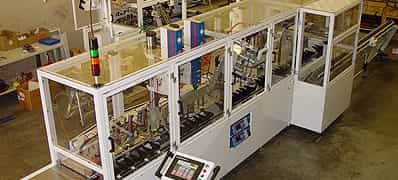Automation is an essential element of success in the rapidly transforming manufacturing and packaging sectors. Factory automation manages the machines that manufacture objects, whereas process automation controls the larger systems that manage these products. Although these forms of automation sound similar, they have key differences that are important to understand before implementing any automation system.
Here we’ll explain the characteristics and benefits of factory automation and process automation.
Factory Automation
 Industrial automation process controls rely on consistent, sequential steps. Through factory automation, manufacturers can create reproducible, highly efficient processes with complete modular control of every step a product needs to go through to transform from an unfinished good to a finished product. Not only does factory automation significantly reduce the manual aspects of a factory process, but it also allows the control center to manage batch control, speed control, and packaging.
Industrial automation process controls rely on consistent, sequential steps. Through factory automation, manufacturers can create reproducible, highly efficient processes with complete modular control of every step a product needs to go through to transform from an unfinished good to a finished product. Not only does factory automation significantly reduce the manual aspects of a factory process, but it also allows the control center to manage batch control, speed control, and packaging.
Factory automation systems use modular programmable logic controllers (PLCs) and micro-controllers that manipulate magnetic valves, on/off drives and motors, switches, actuators, and other components. These functions streamline every part of factory operations, from manufacturing and machining to assembly and packaging.
Some of the key benefits of factory automation include:
- Efficiency: Robotic and software-driven tools can work continuously with minimal energy and material waste. This allows factories to reduce their energy and material expenditures.
- Cost-effectiveness: Not only can factory automation save money on power and raw goods, but it can also produce more at a fraction of the cost of manual labor.
- Precision: Properly managed systems can create high volumes of products with little to no errors and within tight tolerances. This level of precision reduces waste and increases the overall product quality (and brand reputation) of the manufacturer.
- Safety: Automated machinery can handle all of the manufacturing tasks that involve being near sharp, heavy, or loud equipment, significantly reducing the risk of worker injury. These systems can also reduce the risk of repetitive stress injuries among employees that would otherwise have to manually assemble or move goods.
- Versatility: Manufacturers can implement varying degrees of partial or complete factory automation systems, including hard automation, programmable automation, or flexible automation.
Process Automation
While factory automation controls the direct production and packaging of goods, process automation systems control the facilities themselves using analog and digital measurements. Process automation controls the applications that enable facilities to run, such as regulating their heating or power use and other tasks to optimize manufacturing conditions.
Process automation systems operate through a complex network of field sensors that monitor temperature, pressure, vibration, speed, flow rate, and more; logic solvers like PLCs and distributed control systems (DCS); and other open and closed feedback loops. The hardware components of process automation systems include actuators, switches, and valves that the software can toggle to modify the factory settings. These tools use algorithms to analyze input data and determine if systems should be adjusted. For example, a process automation system can analyze a hazardous area and select the most appropriate instruments to use there.
While factory automation systems are like the hands that directly produce objects, process automation systems are like the organ systems that enable the whole body to function.
Industrial Automation and Process Control Solutions from Big Sky Engineering
At Big Sky Engineering, we specialize in designing and delivering custom automation solutions for the packaging industry. From our state-of-the-art facility, we can create cost-effective, comprehensive automation systems that help our clients increase efficiency and scale their business. Contact us today to learn more, or request a quote to start on your custom automation solution.

